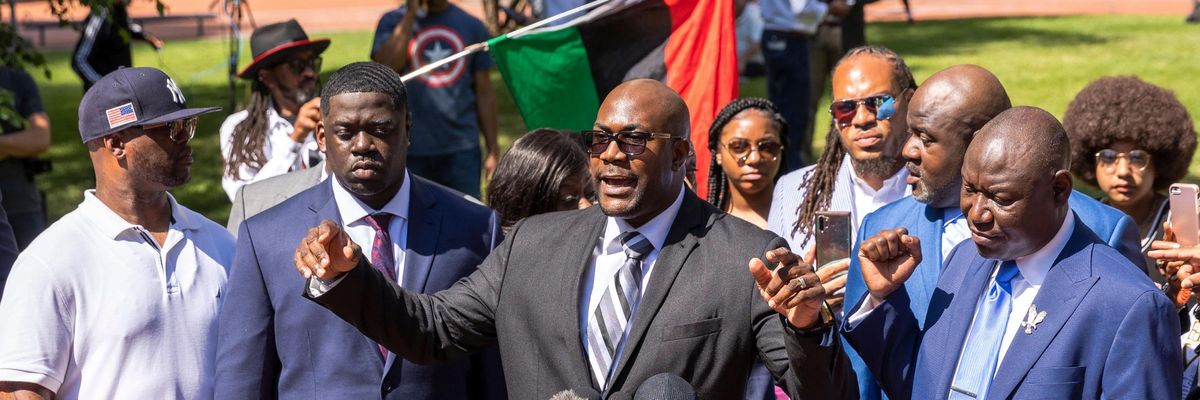While welcoming the accountability represented by Friday's sentencing of former Minneapolis police officer Derek Chauvin to over 22 years behind bars for the murder of George Floyd last year, progressive lawmakers and racial justice advocates joined relatives of the slain unarmed Black man in demanding systemic policing reforms.
"Justice means stopping police violence before it happens, not merely punishing individual police officers for it once it's done."
--Rashad Robinson, Color of Change
Rodney Floyd, George's youngest brother, spoke at a post-sentencing news conference in Minneapolis, where he called Chauvin's 270-month sentence "a slap on the wrist."
"We're serving a life sentence not having him in our life," Floyd said of his murdered brother.
Bridgett Floyd, George's sister and founder of the George Floyd Memorial Foundation, said in a statement following Chauvin's sentencing that "the sentence handed down today to the Minneapolis police officer who killed my brother George Floyd shows that matters of police brutality are finally being taken seriously."
"However, we have a long way to go and many changes to make before Black and Brown people finally feel like they are being treated fairly and humanely by law enforcement in this country," she continued.
"Our focus at the George Floyd Memorial Foundation will now move to building support to ensure that the George Floyd Justice in Policing Act becomes law and brings with it the hope for the substantive change that we need so desperately in this country," she added.
Speaking at the Minneapolis news conference, George Floyd's nephew Brandon Williams said that Chauvin's punishment was insufficient given his crime and the aggravating circumstances of abuse of authority and "particular cruelty," for which Judge Peter Cahill added 10 years to the former officer's sentence.
"When you think about George being murdered, in cold blood with a knee on his neck for nine minutes and 29 seconds execution-style in broad daylight, 22 and a half years is not enough," said Williams. "We were served a life sentence. We can't get George back."
Civil rights and racial justice advocates echoed Floyd's relatives' calls for true justice and meaningful reform.
Jacob Blake Sr., father of Jacob Blake, a 29-year-old Black man shot and paralyzed by Kenosha, Wisconsin police officers who faced no charges for their actions, told MSNBC that "I don't think people understand the pain that the families--that they go through, and we never get justice, man. We never get justice, man. We do everything we're supposed to do, but we can't find justice, man. Why does it elude us?"
Color of Change president Rashad Robinson said in a statement that "while Derek Chauvin's 22.5-year sentence is an important measure of individual accountability, it does not equate to justice for George Floyd's family or the millions of people across the country who protested this murder."
"Black people will not be safe in America until police accountability becomes the rule, not the exception, and until police departments themselves are held accountable for their racist and violent practices," Robinson continued. "Justice means stopping police violence before it happens, not merely punishing individual police officers for it once it's done--we must fight and organize to end police terror in Black communities across this country."
Robinson said that "the verdict falls short of what the Floyd family wanted, and we also know that Chauvin being convicted and sentenced has not changed the culture of policing in this country in any substantive way. During Chauvin's trial, police across this country murdered at least three people a day."
"Justice doesn't come from a single trial or sentence," Robinson argued, "it comes from the major changes that will finally enable Black people to live freely and safely without the constant threat of police violence in their lives every day."
Progressive U.S. lawmakers echoed Robinson's sentiments.
Rep. Ilhan Omar (D-Minn.) called Chauvin's sentence "another step on the path to accountability."
"But punishment for past crimes is not true justice," Omar insisted.
She continued:
True justice will require us as a community and as a nation to address the systems of oppression that create the conditions for injustice. True justice will require us to understand how those who take an oath to protect us repeatedly take the lives of young Black and Brown people. True justice will require us to ask why we continue to spend billions on increasingly militarized police departments, while basic needs like healthcare, housing, and hunger are neglected. True justice will mean addressing decades of economic and social neglect of our most vulnerable people by local, state, and federal government institutions.
"To truly achieve justice," Omar added, "we have to do the hard work to make sure George Floyd's murder, or the countless other murders at the hands of police, never happen again."

